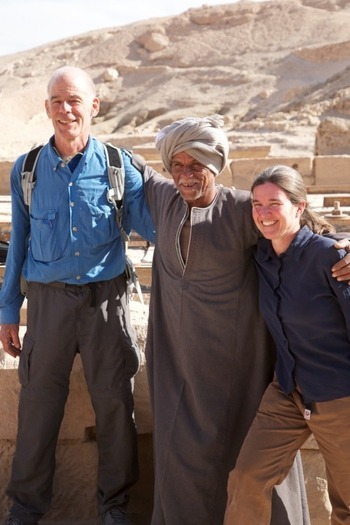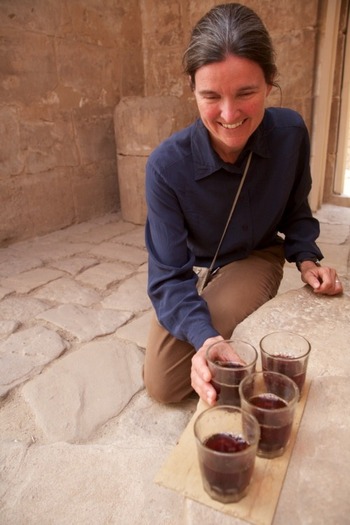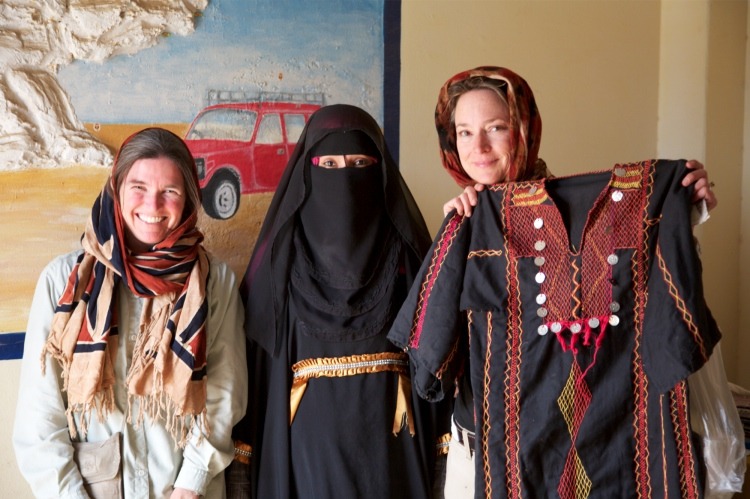 Teen girls at Karnak Temple spent 15 minutes talking with ConserVentures directors Roseann Hanson and Diane Boyer on a recent trip to Egypt.If some of our friends and family thought we were foolish for regularly traveling to Mexico, the reaction when we announced we were going to Egypt was incredulity. “Where? Are you nuts?”
Teen girls at Karnak Temple spent 15 minutes talking with ConserVentures directors Roseann Hanson and Diane Boyer on a recent trip to Egypt.If some of our friends and family thought we were foolish for regularly traveling to Mexico, the reaction when we announced we were going to Egypt was incredulity. “Where? Are you nuts?”
It didn’t help that, shortly after we left Cairo to explore the Western Desert, several Americans were detained by the army (to dramatic headlines in the U.S.), and two women tourists and their guide were kidnapped in Sinai by fractious Bedouin nomads.
We later learned that the detained individuals, who work for several pro-democracy organizations, are most likely headed for a show trial as a last display of power by holdouts from the old regime. The tourists, who were released within hours, commented on the generous hospitality shown by their kidnappers, and retained no animosity at all. Nevertheless, fears for our safety spiked.
Meanwhile, blissfully ignorant of all this, in every oasis and neighborhood we visited we were continually accosted by people who asked where we were from, and on being told “America,” grabbed us, shook our hands, and said, “Thank you so much for coming!” Some were near tears. Everywhere people shouted, “America number one!” and, “Obama!” with big thumbs-up. We lost count of the demands to have our photos taken with residents; there’s no telling on how many Facebook pages we now co-star.
 Sahid Ahmed Kassim has worked as a guard and guide at Temple Deir al Medina for 20+ years. We spent over an hour with him talking about life in Egypt, and his plans to retire soon and return to his farm near the Nile. He shared so much.Egypt, like many countries, depends heavily on tourism for a substantial portion of its income—$11 billion in 2008, from nearly 13 million visitors. Reports indicate that figure plummeted 60 percent after the 2011 revolution against Hosni Mubarak’s despotic regime, which is hardly surprising.
Sahid Ahmed Kassim has worked as a guard and guide at Temple Deir al Medina for 20+ years. We spent over an hour with him talking about life in Egypt, and his plans to retire soon and return to his farm near the Nile. He shared so much.Egypt, like many countries, depends heavily on tourism for a substantial portion of its income—$11 billion in 2008, from nearly 13 million visitors. Reports indicate that figure plummeted 60 percent after the 2011 revolution against Hosni Mubarak’s despotic regime, which is hardly surprising.
But if continued unrest, or just the fear thereof, keeps the numbers deflated, the impact will be severe, and not just on the economy. When wars, political instability, economic downturns, or other calamities affect tourism in countries with otherwise minimal budgets, the things tourists come to see—national parks, historic sites, wildlife preserves—generally suffer first. It’s a simply a matter of immediate priorities.
Therefore, adventurous (or “nuts,” depending on your point of view) travelers still willing to visit countries saddled with dire warnings from the State Department will have an outsized impact, not just from the money they spend but from the hope and good will they spread.
And, as we experienced, the rewards for the “risk” are abundant.
On a purely selfish basis, it was fun to have what felt like exclusive access to places that would otherwise be overrun with busloads of tourists in loud T-shirts and flip-flops trying to cram in the Great Pyramids and the Sphinx before lunch. Of course, once we were out in the desert it’s pretty much tourist-free anyway, but it’s not often you can spend time all by yourself in the King’s Chamber of the Pyramid of Khufu (Cheops), musing in complete silence on the six million tons of limestone blocks over your head.
 Sahid made us his own special brew of tea and served us in the temple while he gave us the history of the temple and its stunning hieroglyphs.On a deeper level, travel promotes cross-cultural understanding, and most especially when countries are in transition, such as Egypt or Kenya. Every opportunity we had we discussed the political situation with everyone from cab drivers to teachers to women in full traditional dress. We learned much, and we hope we shared in equal parts. And quite simply, travel to countries that are struggling to form their democracies shows our support, pure and simple. The gratefulness showed in the faces of so many.
Sahid made us his own special brew of tea and served us in the temple while he gave us the history of the temple and its stunning hieroglyphs.On a deeper level, travel promotes cross-cultural understanding, and most especially when countries are in transition, such as Egypt or Kenya. Every opportunity we had we discussed the political situation with everyone from cab drivers to teachers to women in full traditional dress. We learned much, and we hope we shared in equal parts. And quite simply, travel to countries that are struggling to form their democracies shows our support, pure and simple. The gratefulness showed in the faces of so many.
We also learned quite a few Mubarak jokes, most of which you need to hear in Egypt, preferably in the desert around a campfire, sipping sweet Bedouin tea . . .
All kidding aside, there’s no doubt Egypt is experiencing a spasm of uncertainty, but statistically the chances of encountering trouble due to the political situation are scant—greater Cairo alone has a population of 16 million people. If we hadn’t had occasional access to news we would have assumed the city was humming along more or less normally—and in fact it was.
We even visited Tahrir Square to buy some souvenir revolutionary Egyptian flags. Were we aware that we stood out a bit on the highly unlikely chance someone was looking to make trouble? Sure. Nevertheless, our reaction to the situation on the day we regretfully had to fly home from Cairo was, “Go ahead—kidnap us. Please!”
 We shopped at a store in Baharia Oasis that is run by women, to benefit an orphanage, school, and women's art training program. This is the manager of the store. Talking with her gave us much more of an understanding of the roles of women in Egypt.
We shopped at a store in Baharia Oasis that is run by women, to benefit an orphanage, school, and women's art training program. This is the manager of the store. Talking with her gave us much more of an understanding of the roles of women in Egypt. One of the benefits for us of the lack of other tourists was time alone in some of the most stunning tombs. This is at Deir al Madina, the "workman's village" near the Valley of the Kings.
One of the benefits for us of the lack of other tourists was time alone in some of the most stunning tombs. This is at Deir al Madina, the "workman's village" near the Valley of the Kings. When in Egypt . . . join the Revolution. We visited Tahrir Square and bought souvenirs and wished everyone best of luck with reshaping their future.(Read this interesting and informative op-ed by Thomas Friedman about the current political situation in Egypt. "Egypt's Step Backward"
When in Egypt . . . join the Revolution. We visited Tahrir Square and bought souvenirs and wished everyone best of luck with reshaping their future.(Read this interesting and informative op-ed by Thomas Friedman about the current political situation in Egypt. "Egypt's Step Backward"
